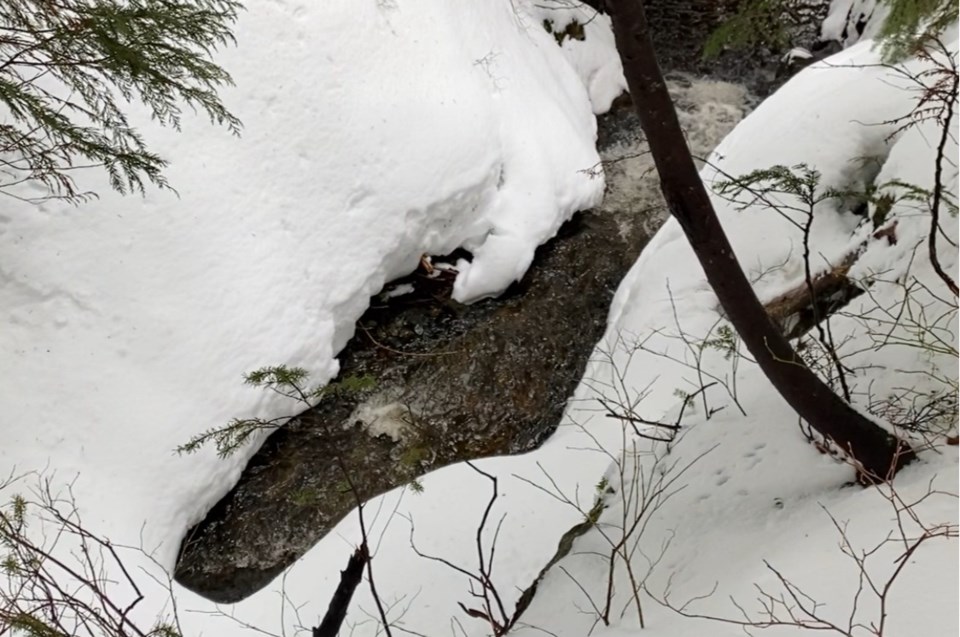Sunshine Coast Search and Rescue started May off with a bang, responding to two calls for assistance on Mount Elphinstone as hikers were ill-equipped to handle the lingering snowpack early in the month.
Sue Duxbury, one of the managers at Sunshine Coast Search and Rescue (SAR) responded to both callouts and said both hikers got off the mountain safe and sound.
She said that every spring SAR receives callouts for hikers who were unprepared for snowy conditions on Mount Elphinstone.
A man and his dog
Duxbury said that at about 4 p.m. on May 4, SAR received a page from RCMP about a young man who had called them from one of the few places cell phones have reception on the mountain.
The hiker had brought no food or water with him, was not dressed for snow conditions and had a small dog with him, she said.
The hiker was trying to catch up to friends who had started up the mountain earlier in the day and were not answering their phones, then entered deep snow.
According to Duxbury, the hiker's dog went down into Langdale Creek where he had to get it.
Wet, cold and with a cramping quadricep, they started to panic and called 911.
As SAR mustered at the Sprockids trailhead and made phone contact with the hiker who said they were coming down the trail.
Noting that he “didn't sound 100 per cent,” a team of three people and one search dog headed up the trail to meet them partway, with more mustered at the trailhead.
Rescuers rendezvoused with the hiker partway down and described him as “cold and wet and hungry and tired, totally unprepared for the conditions.”
When they were off the mountain, the hiker said that because it was such a nice day, they had no idea it would be like that higher up.
Duxbury said that 16 people responded to the page and that it was resolved in three hours.
Déjà vu
The following Wednesday, May 8. Duxbury said SAR had a case of déjà vu as they received a page almost identical to the last, this time with no dog.
“Again, nice sunny day, they decided to go for a hike, nothing with him, no food, no water, no extra clothes, no hiking boots – only took his darn cell phone,” she said, adding that it is common for people to think they only need to take their phone with them on the trails.
This time the hiker had made it to the summit and fell and hurt themself while using the fixed ropes that go over jagged, icy rocks.
Duxbury said that SAR was able to establish phone contact at the trailhead and that the hiker assured them he was okay and heading down the mountain.
Rescuers met the hiker at the bottom of the trail, where Duxbury said he appeared quite remorseful.
Eleven rescuers attended the page, and although crews were not sent into the trail as the hiker was able to self-extricate, Duxbury waited at the trailhead for nearly two hours.
Into thin air
Duxbury said part of the reason incidents like this occur on Mount Elphinstone is its proximity to surrounding neighbourhoods and people thinking they can see the top from ground level.
She would like to see a sign installed at the foot of the trail in Sprockids Park, warning users that they will be entering an alpine environment and a list of recommended items to bring.
While the Sunshine Coast Regional District (SCRD) maintains Sprockids Park, no one is directly responsible for maintaining the Elphinstone trail, which Duxbury said is part of the problem.
She explained that the trail was put in by Dick Culver, a retired geologist, and that since he passed away, no one has claimed the responsibility (or liability as Duxbury put it) of the trail.
While they do not want to discourage anyone from calling for help (and clarifying they never charge the people they rescue), Duxbury explained that sending out a SAR team carries a significant cost, which is supported by the SCRD and the provincial government.
She said SAR advises people to stick to the “three T’s”: tell someone where you’re going, train for your goal and take the essentials, politely adding that “if your dog jumps in the creek, don’t go after it.”
Sunshine Coast Search and Rescue (ground SAR) is made up of 41 people in various stages of life, ranging from retirement to self-employment or full-time work who are ready to drop everything when the call comes in, Duxbury said.
“It's amazing how supportive this community is,” she said, adding how comforting it is to be able to leave work whenever their pager goes off and still have a job when they come back.
Jordan Copp is the Coast Reporter’s civic and Indigenous affairs reporter. This reporting beat is made possible by the Local Journalism Initiative.


.png;w=120;h=80;mode=crop)
